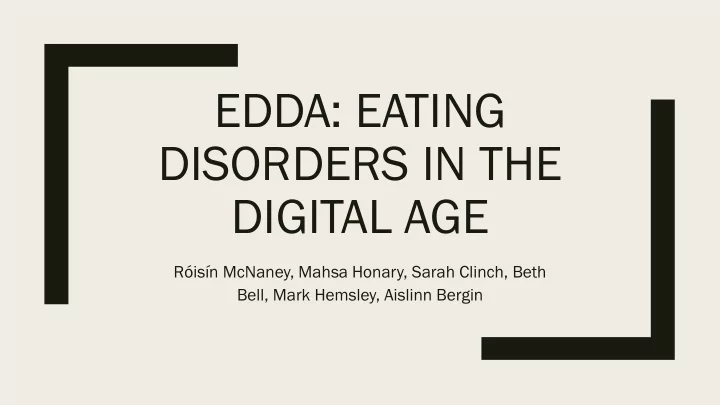

EDDA: EATING DISORDERS IN THE DIGITAL AGE Róisín McNaney, Mahsa Honary, Sarah Clinch, Beth Bell, Mark Hemsley, Aislinn Bergin
Roisin McNaney Sarah Clinch Beth Bell Lecturer in Digital Health Technologies Lecturer in Pervasive Computing Senior Lecturer in Psychology Lancaster University University of Manchester York St. John University Aislinn Bergin Mahsa sa Honar ary Mark Hemsley PhD Candidate (digital mental health) Research Fellow Technical Lead Lancaster University The Anna Freud Centre University of Chester
The Wider Vision ■ EDs affect 725,000 in UK ■ Majority of those affected will not be underweight ■ 80% of 10 yo’s on a diet to change body shape ■ Social media pressures to conform to ‘healthy’ lifestyles ■ Mobile phone apps freely available (calorie control, fitness tracking, social media uploads around health and fitness) ■ Limited understanding of the safety measures, if any, they have in place for possible misuse
The Wider Vision ■ Wider project aims to – Understand mobile behaviors of those at risk – Explore current safety measures – Develop responsibility guidelines – Develop set of context aware tools to support identification of (and intervention to) negative behavior
Wider EPS challenges ■ Human Centric Systems (HCS); Data Analytics (DA); Sensing Systems (SS) ■ People at the heart of technology design [HCS] ■ Inferring behaviour using sensed interactions [DA] ■ Interaction design [HCS] ■ Feedback to influence mental state [HCS] ■ Technical infrastructure [SS]
Stage 1 activities ■ Will address EPS challenge "people at the heart of technology design" ■ Relationship building [Months 1-6] ■ Scoping workshops [Months 3-8] ■ Analysis [Months 8-9] of the top 100 healthy eating and fitness applications ■ Design workshops [Months 9-12]
Stage 1 deliverables D1: Identification of negative application usage behaviours D2: A review of the top 100 “Health and Fitness” applications D3: A set of guidelines for responsible application design D4: A set of implementable countermeasures that have the potential to address or mitigate negative behaviours. Further funding for countermeasure solutions
Initial scoping workshops (January- February 2018) North East England ■ Body positive campaigners in York ■ Young app users in York North West England ■ Lancaster Girl Guiding Group in Preston ■ Child and Adolescent Physiatrists in Manchester Expected outcome ■ develop a set of warning signs, or trigger points which indicate negative behaviours
Safeguards against development of negative behaviours (March-April 2018) Review of top 100 apps on Google Play including ■ healthy eating apps ■ fitness apps
Design workshops (May-June 2018) ■ With the same groups ■ Explore the design of a set of responsibility guidelines ■ Identify potential countermeasures to mitigate negative app use
Any questions?
Recommend
More recommend